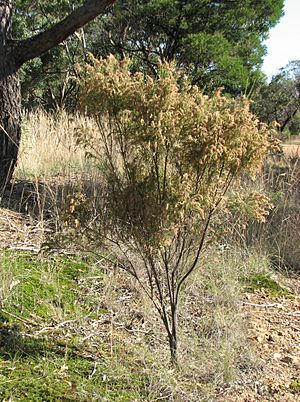Drooping cassinia facts for kids
Quick facts for kids Drooping cassinia |
|
|---|---|
 |
|
| Scientific classification |
|
| Kingdom: | Plantae |
| Clade: | Tracheophytes |
| Clade: | Angiosperms |
| Clade: | Eudicots |
| Clade: | Asterids |
| Order: | Asterales |
| Family: | Asteraceae |
| Genus: | Cassinia |
| Species: |
C. arcuata
|
| Binomial name | |
| Cassinia arcuata |
|
| Script error: The function "autoWithCaption" does not exist. | |
| Synonyms | |
|
|
Script error: No such module "Check for conflicting parameters".
Cassinia arcuata, often called drooping cassinia, biddy bush, Chinese scrub, Sifton bush or tear shrub, is a type of shrub. It belongs to the Asteraceae family, which is also known as the daisy family. This plant is special because it is endemic to southern Australia. This means it is only found naturally in that part of the world.
Contents
About Drooping Cassinia
This shrub can grow up to 2 metres (about 6.5 feet) tall. Its leaves are quite sticky. They are usually between 40 and 15 millimetres long and about 1.5 millimetres wide.
Flowers and Scent
The plant produces pale brown inflorescences, which are clusters of small flowers. These flower clusters appear in panicles, which means they grow in branched groups. You can see them from spring all the way through autumn. One cool thing about these plants is their unique smell. They have a strong, distinctive scent that reminds many people of curry!
Where It Grows
Drooping cassinia is known for being a pioneer plant. It often grows in places where the land has been cleared or changed. This includes areas that have been disturbed by humans or natural events. It is native to several Australian states. You can find it growing naturally in Western Australia, South Australia, New South Wales, and Victoria.
Growing Your Own Drooping Cassinia
If you want to grow this plant, it's fairly easy to take care of. It needs soil that drains water well, so it doesn't like soggy feet! It also prefers to grow in full sun or a spot that gets some shade.
However, it doesn't like salty winds, so it's not the best choice for coastal areas. Keep in mind that this plant doesn't live for a very long time. But while it's around, it adds a unique look and scent to a garden.
 | Victor J. Glover |
 | Yvonne Cagle |
 | Jeanette Epps |
 | Bernard A. Harris Jr. |

